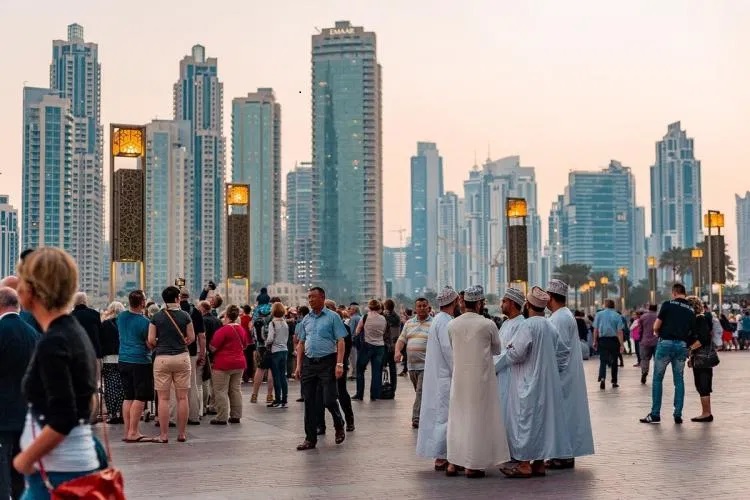The diplomatic tension between Nigeria and the United Arab Emirates (UAE) deepened after the authorities in the Middle East country reportedly ‘barred’ other airlines from bringing Nigerian passengers.
This is just as both countries began to count their losses following the restrictions imposed on the UAE carrier, Emirates, by the federal government.
- EXCLUSIVE: UAE ‘bars’ airlines from flying Nigerians to Dubai as row deepens
- ‘We need your support’, UAE writes Sirika over Nigeria’s action against Emirates
The government had through the Nigeria Civil Aviation Authority (NCAA) imposed the restrictions on the airline, slashing its frequencies from 21 weekly to one in retaliation for denying Air Peace, a Nigerian carrier, the three slots it asked for at Sharjah Airport.
According to the Director-General of NCAA, Capt. Musa Nuhu, Emirates is to operate only one weekly flight to Nigeria on Thursdays.
But the airline, in response to the restrictions, immediately suspended all its flights to and from Nigeria pending the resolution of the issues between the two countries.
As of Monday, the two countries were yet to come to the negotiation table on resolving the lingering diplomatic strain which broke out barely two weeks after they settled earlier disagreements.
In a further show of force, the UAE had reportedly barred other airlines from accepting Nigerian passport holders with several passengers turned back on Ethiopian Airlines.
Daily Trust reports that this is the first time in a long while that Nigeria would be coming out in full throttle to slam heavy restrictions on a foreign carrier under the principle of reciprocity contained in the Bilateral Air Service Agreement (BASA).
As the row lingers, both countries, especially stakeholders, service providers and those whose businesses are tied to Nigeria-UAE-Nigeria flight operations in both countries are counting their losses.
The Dubai route is one of the top business and holiday destinations for Nigerians with weekly passenger traffic estimated at about 10,000 passengers while Emirates takes the largest chunk of the traffic.
Emirates alone brings about 900 passengers (about 300 in each of its arrivals in Lagos and Abuja on its A380 aircraft) from Dubai on a daily basis while other airlines contribute other passengers through connecting flights.
Other airlines transiting to Dubai from Nigeria include Qatar Airways, Egypt Air, Ethiopian Airlines and RwandAir, among others.
With an average of N300, 000 per ticket, the airline would be losing close to N270m or $650,000 or 2.5m UAE dirham weekly from ticket sales alone.
If the current row lasts for a month, it means the airline would be losing over N1.8bn.
This also comes with a huge loss to the federal government in terms of the charges payable on each flight.
For international travel, the airline pays the Federal Airports Authority of Nigeria (FAAN) $100 as passenger service charge (PSC); $20 security charge and 5 per cent passenger service charge.
This amounts to a loss of $90,000 or N36.9m payable as PSC on Emirates’ three daily flights alone.
Also, Air Peace, which is the sole Nigerian carrier operating to Dubai via Sharjah, is counting its losses from about 1,200 (both inbound and outbound) passengers it airlifts to Dubai on its three weekly flights which the UAE is yet to restore.
If other airlines were barred from carrying Nigerian passengers to Dubai, it is estimated that all the airlines put together would be losing millions of dollars on a daily basis due to the busy nature of UAE.
As far back as 2019, the Dubai Embassy in Nigeria confirmed that 100,000 Nigerians visit Dubai annually for tourism, education, medical tourism and for business.
The volume of trade between the two countries is estimated to be about $1.5bn with about 30 flights happening weekly between UAE and Nigerian carriers.
Checks by Daily Trust also indicate that hotels would be losing daily income from accommodation for airline crew as a result of the stalemate.
For instance, there is an average of 13 to 16 cabin crew members on an international flight.
While a set of the crew arrives with a flight, another set already accommodated in any of the five-star hotels in the destination country takes over the next flight.
Hotel accommodation also costs an average of $262 per night (N107,000 at the official exchange rate).
This means that a Nigerian five-star hotel accommodating a flight crew could be losing about N1.4m daily on a 13-man flight crew.
Commenting on the development, President of the National Association of Nigerian Travel Agencies (NANTA), Mrs. Susan Akporiaye, said the development is a huge loss for both countries.
But she said the position of the association is that the UAE should do the right thing by granting Air Peace the requested slots while the Emirates frequencies should also be restored.
She said, “Of course there will be losses; losses on both sides. There is a massive loss also on UAE, not Nigeria alone. It is just that they don’t want to admit it. Even the travel agencies, we are losing and there are losses on businesses and all but then it is the closure of the airports. It is not a total lockdown like we experienced last year.
“So people will still fly, go to African countries. South African Airlines resumed yesterday. Egypt is there, Rwanda, beautiful place, Seychelle, Maldives, and many other countries are there as well. Even the US is still open, the US is not closed and Europe is open as well.”
Akporiaye also confirmed that Dubai-bound passengers were barred on Ethiopian Airlines yesterday while other airlines like Qatar, Egypt Air still flew with Dubai passengers on board.
“Maybe it is only the Ethiopian Airline that was affected, we don’t know yet. We are waiting to see, because immediately I heard about what is happening, I reached out to other airlines and they said they didn’t get any notice and that their flights flew. They promised to get back to me if anything changes.
“As of this morning, Ethiopian airlines got their own notice, we don’t know exactly what is going on but they promised to send me a notice so we will wait till tomorrow. If by tomorrow those airlines still flew then that means it is a problem with only Ethiopian Airlines.”
Akporiaye asked the UAE authorities to grant Air Peace’s request in order to resolve the stalemate.
“Let them do what we want. Let them give Air Peace the three slots that they asked for and we will give them back their 21, that is fine. It is very simple actually, let them just do the right thing. It is the normal and moral thing to do,” she added.
When contacted yesterday on the alleged ban on Nigerians in UAE, the Director of Press Affairs in the Ministry of Aviation, Dr. James Odaudu, said he had called the attention of the minister to it.
Asked about the losses to the country, he said, “I don’t see how we can be at the losing end. These are people who are saying Nigerians should not come into their country. If you say we should not come into your country and you want to keep flying to our country, who are you coming to pick?
A former spokesman of the defunct Nigerian Airways, Mr. Chris Aligbe, in an interview with our correspondent asked Nigeria to stand its ground irrespective of the action of the UAE government.
“The fact of the matter is that the UAE has a right to decide whatever they want to decide. Whatever they decide with other airlines, I am not bothered about it. It is what they decide about Nigeria that I am bothered about.
“If they take a decision about us and make it impossible for us to operate, then we should respond, that is my position,” he said.
Consultations ongoing – Foreign Affairs
The federal government said consultations are ongoing to address the lingering diplomatic row between Nigeria and the United Arab Emirates (UAE).
The spokesperson of the Ministry of Foreign Affairs, Esther Susunwa, disclosed this in an interview with Daily Trust on Monday.
On whether the decision taken by the aviation minister is within the confines of diplomatic law, she said, “I cannot speak for aviation ministry.”
Countries pushing for self-interest, says don
However, a professor of international relations, Abdullahi Liman, of the Department of Political Science and International Relations, Nasarawa State University, said the decisions taken by both Nigeria and UAE are right, so long as it’s about the national interest.
“The decision of the Nigerian Aviation minister to ban UAE airlines is not about wrong or right, it’s about national interest, and you should know that countries have an agenda in every decision that they take, which to me is normal.
“They have an agenda that they are pursuing and at a point in time, they take action that will trigger reaction, so we shouldn’t waste our time thinking about wrong or right, it’s the national interest that dictates everything.
“So, to me, what the UAE did was right and what our minister has done is equally right, and it’s the kind of leadership that Nigeria lacked for a very long time; somebody that will stamp his feet on the ground and stood by the national interest.
“Nigeria has faced so much humiliation in the past; even inferior nation states have been confronting Nigeria without much action. Successive administrations have done their best in protecting the national interest.”
He said the whole issue is about “national interest” but is Nigeria really ready to use the two options that dictate the fate and direction of the national interest? The two interests are holding a carrot on the right hand, and stick on the left hand. Any nation that goes along with us can take the carrot and eat, and if you are not with us we can now apply the big stick.
“In a nutshell, the economic benefits between Nigeria and UAE are complementary; we both need each other, so we will not sit down and take every sh-t from nations that equally benefit from us.
“So, what the minister of aviation did is very right, and we will just dwell on this terrain, and to me, this will not extend to the general function because it has not affected the entire diplomatic relationship.
“Our only problem is that we are respecting these people too much. I’m being very frank. It is good we push back when their excesses are becoming too much,” he said.

 Join Daily Trust WhatsApp Community For Quick Access To News and Happenings Around You.
Join Daily Trust WhatsApp Community For Quick Access To News and Happenings Around You.

